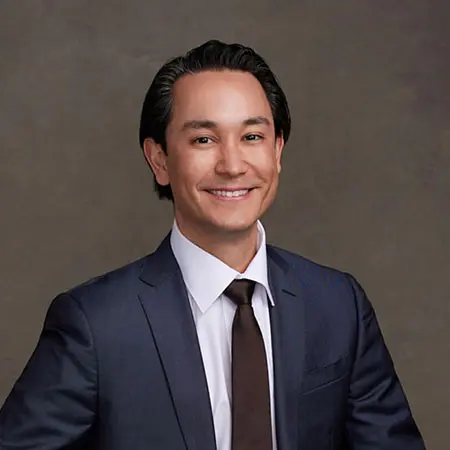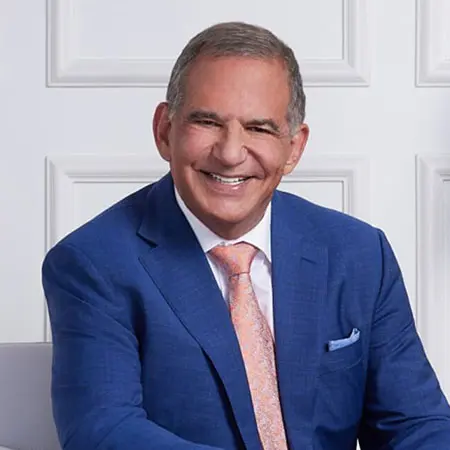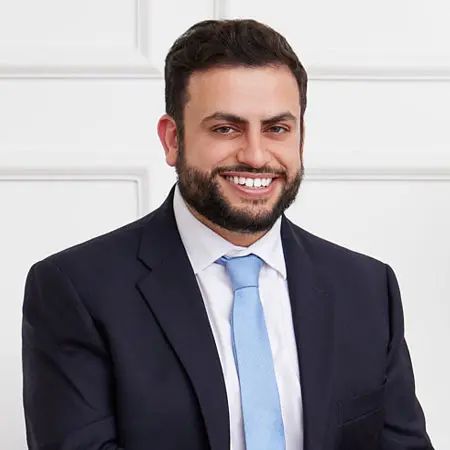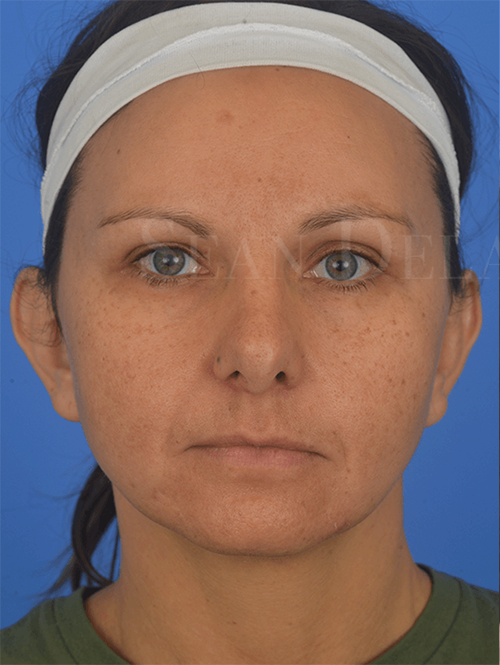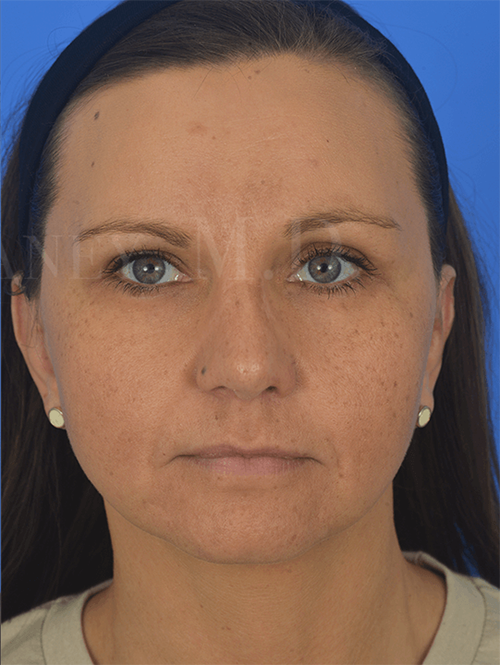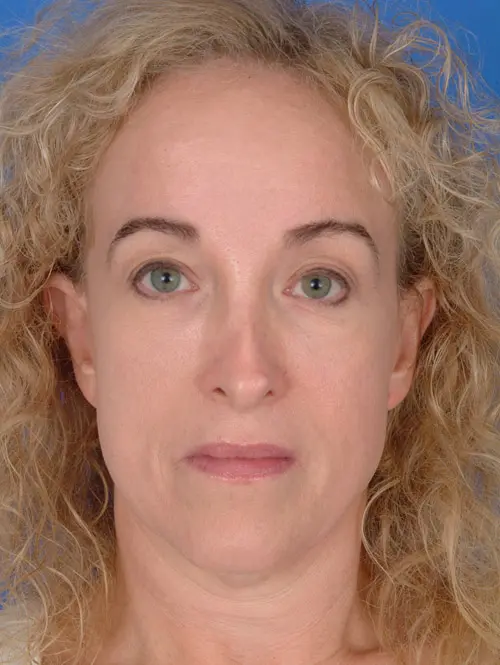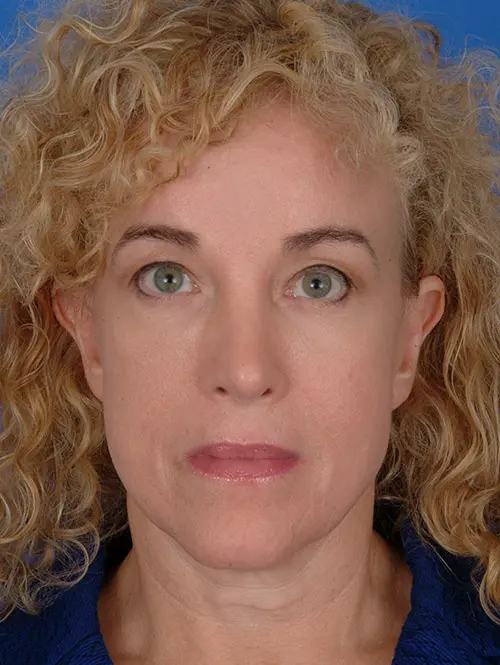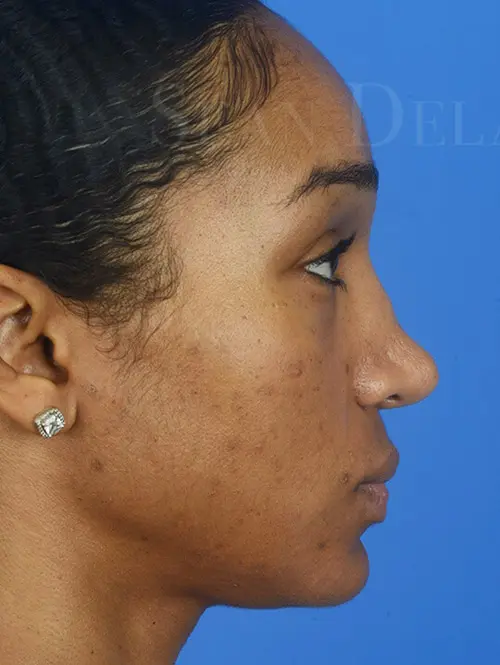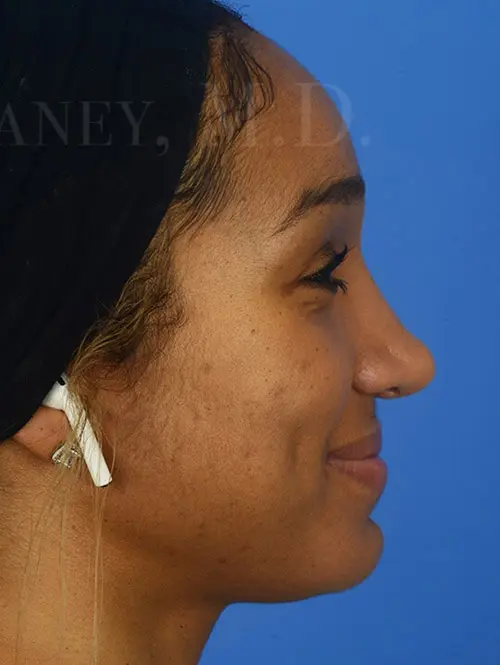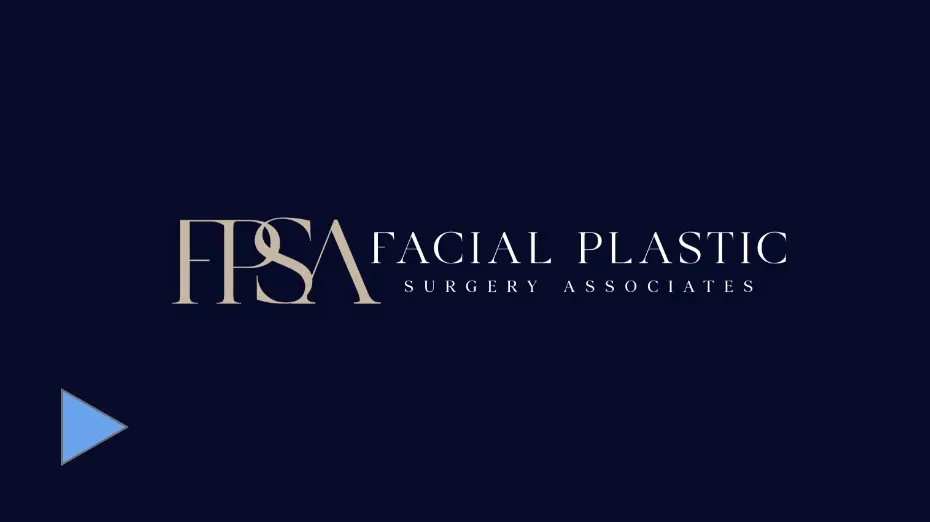 Model
Model
Revision Rhinoplasty in Houston, TX
Sometimes, a previous Rhinoplasty procedure performed by another physician may not have achieved your desired outcome. As globally recognized experts in nasal surgery and the most experienced Revision Rhinoplasty specialists in Houston, Dr. Russell Kridel and Dr. Sean Delaney can help you achieve a more optimal outcome.

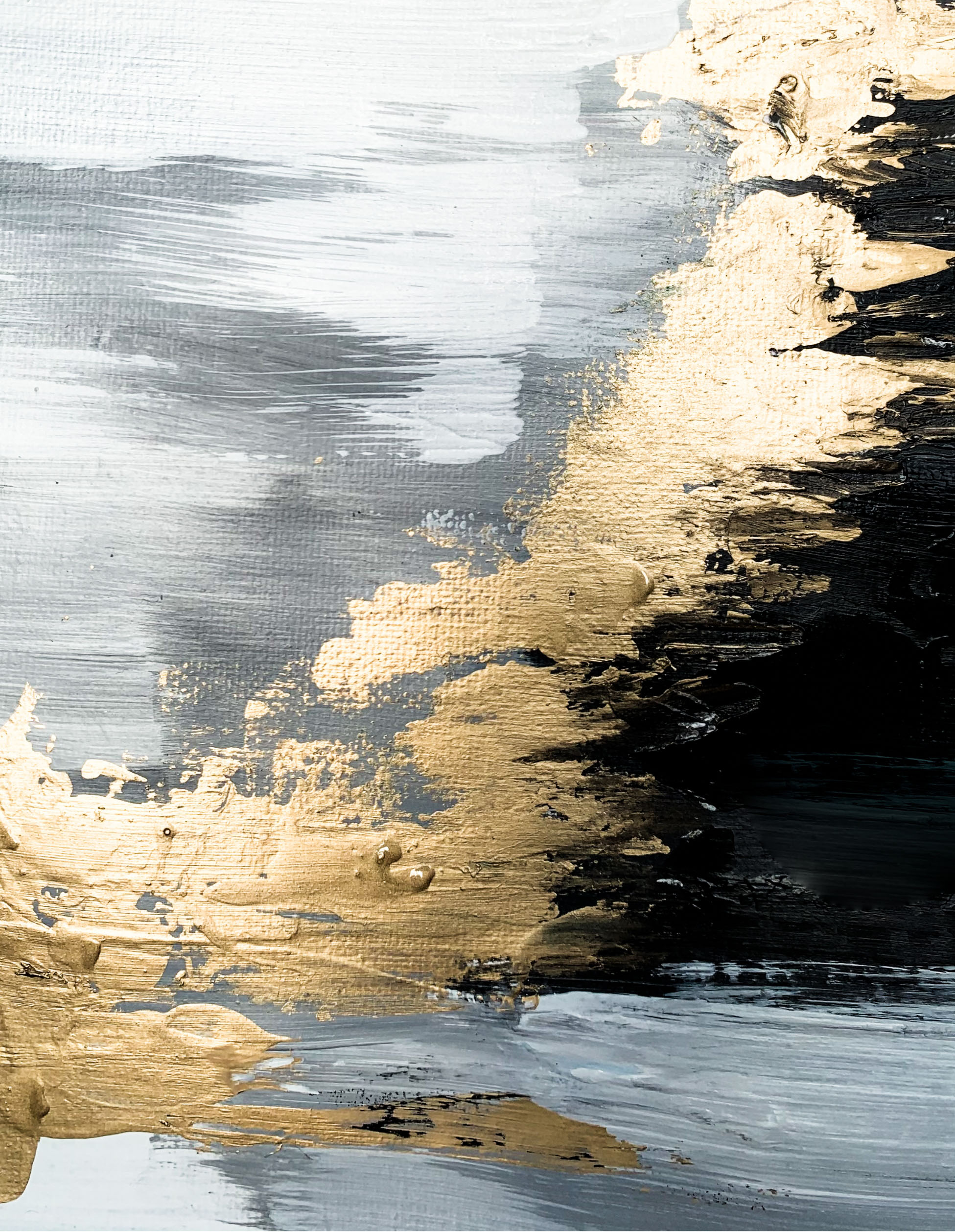 Model
Model
What Is Revision Rhinoplasty?
While patients undergo Rhinoplasty with the expectation to improve their appearance or breathing, sometimes a less desirable outcome can occur. Revision Rhinoplasty (also called secondary rhinoplasty) is a surgical procedure to repair both the form and function of a nose that has previously been operated on.
Recognized as the leading Revision Rhinoplasty surgeons in Houston for their advanced techniques, technical skill, and depth of experience, Dr. Russell Kridel and Dr. Sean Delaney can help correct these issues. Over 60% of the Rhinoplasty surgeries we perform are revisions of previous Rhinoplasty completed by another physician, which speaks to the level of our surgeons’ expertise.
At your Revision Rhinoplasty consultation, we perform a comprehensive examination, including evaluation of the septum, nasal valves, and internal nasal structures called turbinates. At FPSA we believe it is important to holistically address your entire nasal structure, both cosmetically and functionally to create the optimal treatment plan for your revision surgery.
Revision Rhinoplasty pricing with FPSA also includes Revision Septoplasty, and Inferior Turbinate Reduction as recommended by your surgeon during your consultation. If rib cartilage and/or dermal grafts are also needed, there will be an additional cost.
Why should I select FPSA for my Revision Rhinoplasty?
Revision Rhinoplasty is considered the most challenging procedure in facial plastic surgery. Very few plastic surgeons perform Revision Rhinoplasty because of the level of difficulty and even fewer have the success rate of Dr. Russ Kridel and Dr. Sean Delaney. Other surgeons in Houston, and throughout Texas, commonly refer Revision Rhinoplasty cases to them, particularly complex ones, because of their unparalleled training, advanced surgical techniques, attention to detail, depth of experience, compassionate care and successful results.
Dr. Russell Kridel is recognized by peers and patients as one of the best Revision Rhinoplasty surgeons in the country. He has published over 150 scientific journal articles and textbook chapters on his successful Revision Rhinoplasty surgical techniques. Dr. Kridel has been a featured guest speaker at hundreds of plastic surgery conferences all around the world to share his advanced surgical expertise on Revision Rhinoplasty. Dr. Sean Delaney previously trained under Dr. Kridel and has extensive experience as well in revision nasal surgery. He has co-authored numerous medical journal articles on Revision Rhinoplasty with Dr. Kridel and shares similar surgical approaches. He has been named a Texas Rising Star in plastic surgery and a Castle Connolly “Top Doctor”. Together, they are known in Houston as “The Nose Docs,” with patients, including physicians and their family members, coming not only from Houston, but from all around the country to have their Revision Rhinoplasty performed at FPSA.
You will be in the best of hands with our Revision Rhinoplasty experts.
What can I expect at my consultation?
Our Revision Rhinoplasty consultations are quite comprehensive, you can expect to be with us for approximately two hours. When you first arrive, an FPSA team member will take your photograph at multiple angles and will also review your medical history and patient information forms with you. It is also helpful for patients to provide operative reports of their previous surgery to share with Dr. Delaney or Dr. Kridel prior to the consultation (or at the time of the consultation).
Our surgeons perform a thorough examination, including evaluation of the septum, nasal valves, and other internal nasal structures. Your surgeon will provide an honest assessment of your nose and will discuss the recommended approach to address your concerns so that your nose not only looks better, but also breathes well after surgery. With Revision Rhinoplasty surgery it is important to understand that your nasal structure has been compromised and altered from previous surgery and cannot be returned to its original state. Improvement rather than perfection is the goal for surgery.
During your Rhinoplasty consultation, Dr. Delaney and Dr. Kridel will ask you what bothers you about your nose and what you would like to see changed. They will also review your medical history and any medical records you provide. Based on your discussion and agreed upon goal for surgery, we will digitally morph your photos so that you can visualize the potential results from surgery. We will review the imaged photos with you to make sure that you share the same aesthetic vision. Dr. Delaney and Dr. Kridel take the imaged photos into surgery with them so that they can come as close as possible to your surgical goal. Very few plastic surgeons do this.
You will have the opportunity to share all your questions and concerns with your surgeon during your consultation. In addition, one of our patient concierges will accompany you every step of the way as your guide from your consultation to your post-operative care. The concierge will review before and after photos of other Revision Rhinoplasty patients, educational materials specific to Revision Rhinoplasty, and provide you with an estimate for your individualized treatment plan.
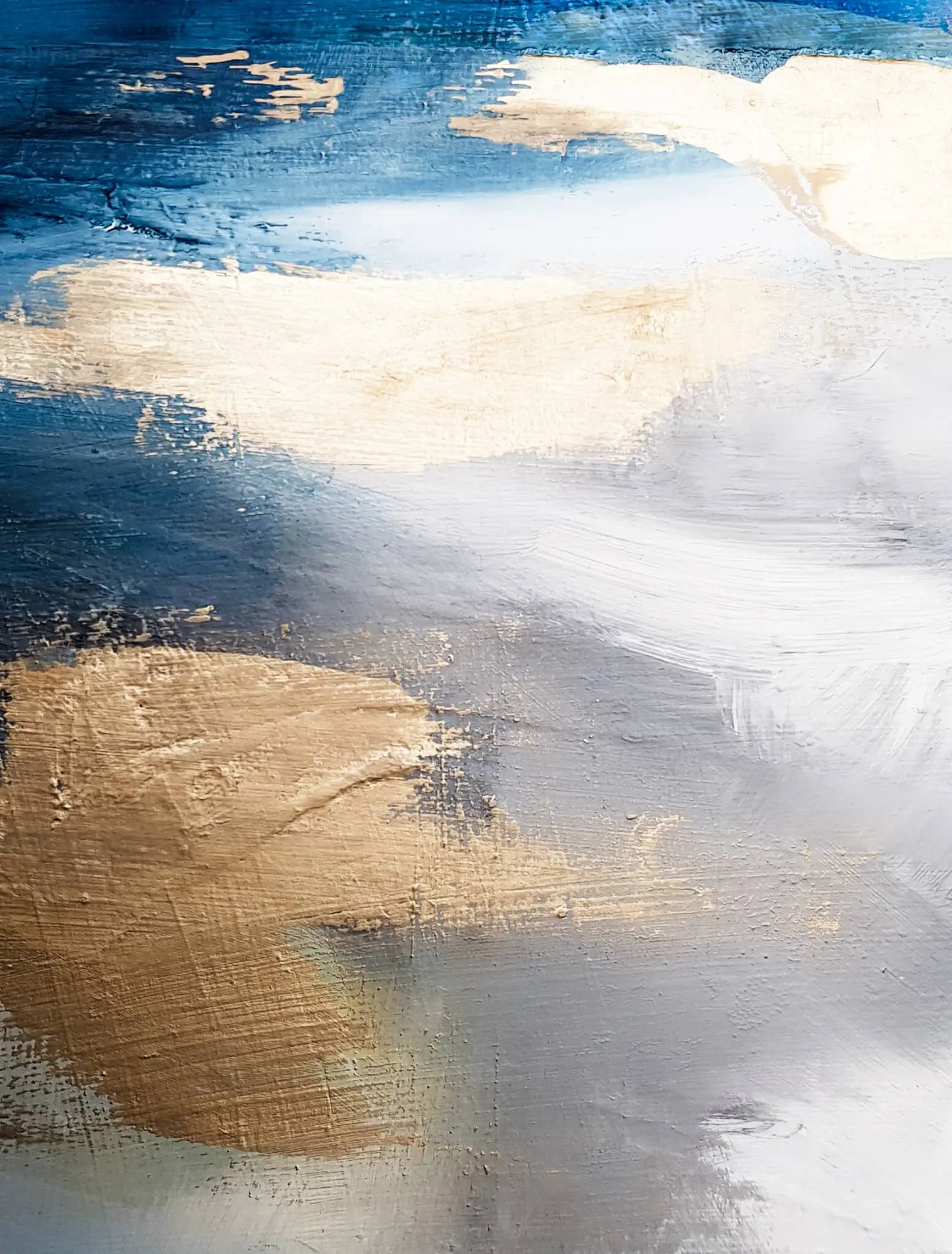
How do experts
Dr. Delaney and Dr. Kridel approach Revision Rhinoplasty?
When a patient undergoes a Primary Rhinoplasty procedure, scar tissue can develop that complicates subsequent Revision Rhinoplasty surgery. Every detail of Revision Rhinoplasty is more complex than with Primary Rhinoplasty, and is magnified by the hesitancy many patients express around additional surgery. Dr. Kridel and Dr. Delaney understand that there is a large degree of variability in secondary Rhinoplasty deformities and understand the higher level of sensitivity of your concerns.
Dr. Kridel and Dr. Delaney do not believe in compromising your nasal function for a better-looking nose. Your nasal function is vital and is as important as your aesthetic outcome. For a majority of Revision Rhinoplasty patients, Dr. Kridel or Dr. Delaney must construct a new supporting nasal structure to provide a proper shape. These major reconstructions are extremely difficult and necessitate an accurate understanding of three-dimensional nasal contours. That is why it is so important that you select a Revision Rhinoplasty specialist experienced in more complex issues around structure and function that may have been compromised or incompletely addressed by primary surgery.
Over his 30+ years of private practice, Dr. Kridel has mastered and refined, and continues to refine, his highly regarded nasal surgery techniques. Because no two noses are alike, particularly with Revision cases where so much of the nasal anatomy has been compromised, Dr. Kridel will tailor his surgical approach and technical maneuvers to achieve the functional and aesthetic goals discussed during your consultation. His surgical approach could include the use of ear cartilage and/or homologous rib cartilage, for example. This important adaptation of a wide range of proven techniques, detailed in the vast number of Dr. Kridel’s peer-reviewed journal articles and textbook chapters, reflects his recognition of the importance of planning and precision. Dr. Sean Delaney was trained by Dr. Kridel and utilizes a similar range of meticulous maneuvers for his Revision Rhinoplasty patients.
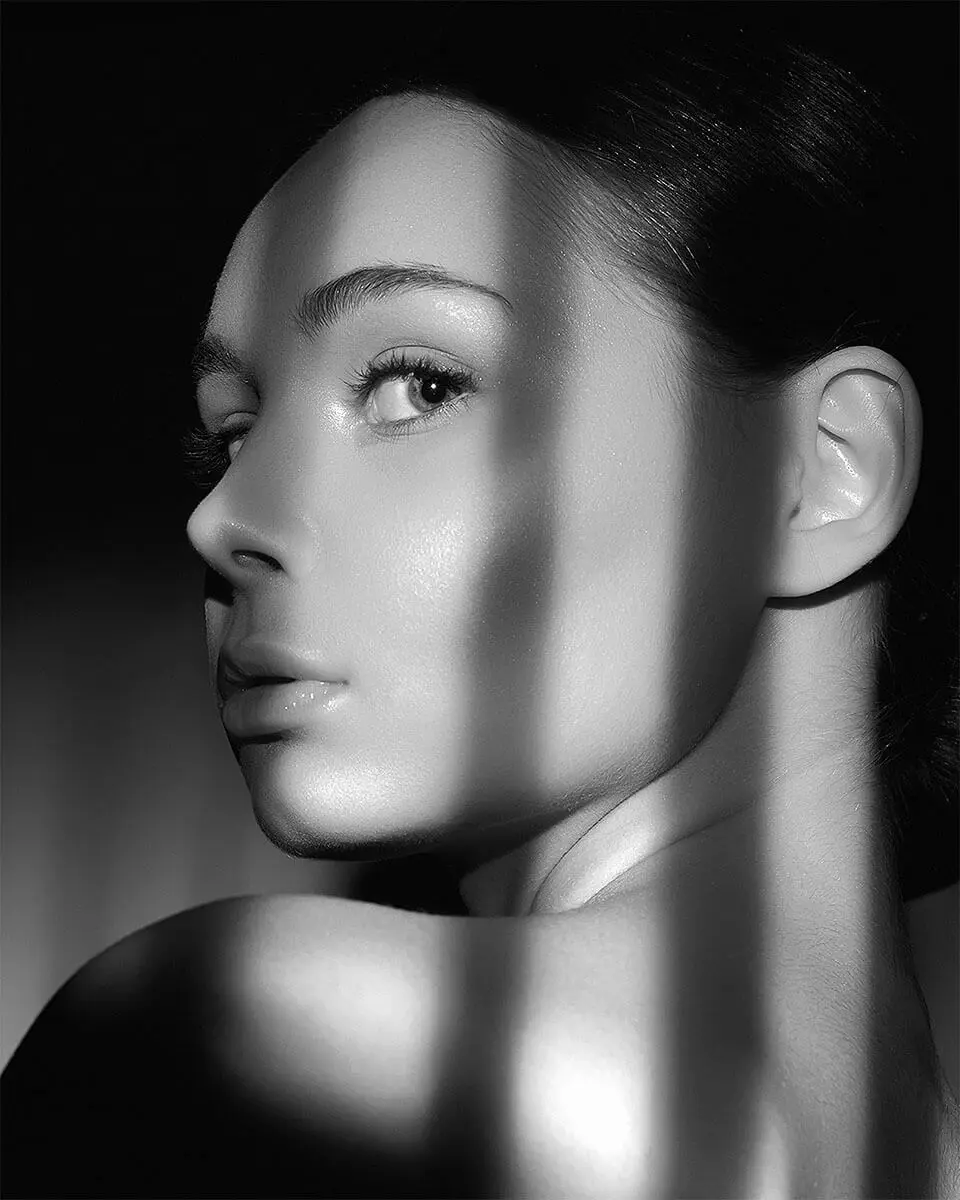
 Model
Model
Am I a good candidate for Revision Rhinoplasty?
Because the internal anatomy of your nose has already been altered, the options available for correction are more complex and time-consuming. Patients with realistic expectations for improvement are the best candidates. Dr. Delaney and Dr. Kridel understand that a suboptimal outcome from a previous Primary Rhinoplasty can be very disappointing and quite stressful. Our surgeons will provide an honest assessment and an honest treatment plan for your specific situation. They will not recommend surgery if they don’t believe they can help you achieve your goals. You will need to be at least one-year post-op from your last Rhinoplasty surgery performed elsewhere before consulting with Dr. Delaney or Dr. Kridel. Dr. Delaney and Dr. Kridel will not perform Revision Rhinoplasty if your medical history contraindicates surgery or on patients with a currently active history of smoking, vaping, or using illicit drugs, because these activities significantly compromise the healing process.
When is my pre-operative appointment?
Once you have decided to proceed with Revision Rhinoplasty, your pre-op appointment will take place two to three weeks before your scheduled surgery. We strive to make this appointment as stress free as possible. At this appointment, you will receive pre-operative and post-operative instructions, review and sign consents, take pre-operative photos, and make final payment. You will also receive a list of your prescriptions. Most of our patients find that using our Capsule Pharmacy service in advance is quite convenient because all prescriptions will be delivered to our office and ready for you at the pre-op appointment.

 Model
Model
What do I need to do before surgery?
With any surgical procedure, it is necessary to avoid any medications or supplements that may thin the blood two weeks before and two weeks after your surgery. Our clinical staff will review instructions relating to medications and supplements at your pre-operative appointment.
Dr. Delaney and Dr. Kridel do not operate on patients who smoke, chew tobacco, vape or take illicit drugs prior to or at the time of surgery, as these activities have a detrimental effect to the healing process. Surgery can be cancelled if drug tests prior to surgery indicate usage.
We recommend that patients avoid alcohol for two weeks prior to and after surgery. You should maintain a healthy diet and avoid salty, fatty foods and processed sugar. Some patients eat pineapple for the anti-inflammatory effect of its naturally occurring Bromelain. We recommend taking Arnica, Bromelain, and Vitamin C supplements 5 days before the surgery and 1 week following surgery. It is also very important to avoid significant sun exposure.
Dr. Delaney and Dr. Kridel also believe that having healthier skin at the time of surgery will also help the healing process. Since you will have a splint on your nose for the first week, we provide patients with a complimentary nasal pore extraction treatment with our medical esthetician, Maria Alanis at your pre-op appointment. No other plastic surgery practice in Houston provides this complimentary service. Patients also receive a lovely beauty kit with post-operative supplies, hair towel and eye mask. At this appointment, patients like to select skin care products appropriate for pre-operative and post-operative skin health and optimal healing.
Day Of Surgery
What happens on the day of surgery?
Revision Rhinoplasty is an out-patient procedure performed under general anesthesia at an ambulatory surgery center and typically takes approximately 4.5 to 5.5 hours to complete depending on the level of complexity. You should have nothing to eat or drink (not even water, candy, or gum) after midnight the night before your procedure. Patients should arrive approximately 1.5 hours prior to the start time on the day of surgery. You should wear a button-up top or loose-fitting clothing to allow you to change easily without placing unnecessary pressure or stress on the nasal area. You will need an adult driver on the day of your surgery to bring you to the surgery center and to take you home.
What can I expect right after Rhinoplasty surgery?
Dr. Delaney and Dr. Kridel do not pack your nose with uncomfortable Doyle splints. Instead, special soft material is placed inside your nose to hold the newly repositioned tissue in place. You will be seen the very next day in our office, and the material will be removed. You will need to sleep on your back with your head slightly elevated for the first several days to a week after surgery.
Our patients often comment that the discomfort is far less than they expected. Most patients feel very little pain immediately after surgery but may experience some discomfort later in the evening or the next day or so. We prescribe pain medications to help you feel more comfortable. However, we have found that most patients transition to Tylenol after 24-36 hours.

 Model
Model
Recovery Time
What is the recovery period for Revision Rhinoplasty?
Our surgical techniques and pre-operative and post-operative care are designed to help the healing process. However, swelling and bruising will take place, with the majority of bruising subsiding within a few weeks. For many, the amount of swelling may be greater than after the first Rhinoplasty surgery. When your splint comes off after 5-7 days, you will see noticeable improvement, but there will still be swelling. You will also notice improvement in your breathing if undergoing functional surgery.
It takes approximately 4-6 months for about 80% of the swelling to go down. Your nose will continue to look better and better over the months to come until you see the final result “settle in” within approximately 2 years.
Most patients feel like themselves after just a few days. As a general rule of thumb, patients can return to work after a week to two weeks, after the splint and compression tape comes off.
Dr. Delaney and Dr. Kridel will be with you every step of the way during your journey. We will see you multiple times over the first two weeks, and also at 1 month, 3 months, 6 months and 1 year. Our high standard of patient care, including follow-up care, is unparalleled in Houston.
How do I find the best Rhinoplasty surgeon for me?
Revision Rhinoplasty surgery is the most complex and difficult surgery of the face. It is important that patients select a facial plastic surgery specialist who is familiar with the anatomy and has extensive training and experience specific to nasal surgery, particularly Revision Rhinoplasty.
Dr. Delaney and Dr. Kridel are board-certified in Otolaryngology, Head & Neck Surgery and board-certified in Facial Plastic and Reconstructive Surgery, so they have a unique knowledge of the function, anatomy, and the aesthetics of the nose. With our surgeons, you are in the hands of award-winning experts recognized by other physicians for their expertise and they have published extensively in scientific medical journals and textbooks on Revision Rhinoplasty.
There is a great deal more to selecting your Revision Rhinoplasty surgeon than reviews and media posts. We have provided a handy guide of the 10 best questions when selecting a surgeon for your Revision Rhinoplasty.

 Model
Model
If I am not happy with my Rhinoplasty, when can I get a Revision Rhinoplasty?
It takes at least a year for your nose to fully heal from your first Rhinoplasty. Dr. Kridel and Dr. Delaney will not perform a Revision Rhinoplasty before the one-year mark.
You may be tempted to correct any perceived issues soon after the initial surgery, but it’s best to wait at least a year before undergoing another procedure. That’s ample time to allow the healing process to complete, swelling to subside, and scar tissue to soften. Then you’ll have a realistic idea of what your nose looks like and what, if any, further corrections need to be made.
We also encourage patients who are experiencing any concerns with their primary Rhinoplasty to discuss their concerns with their original surgeon.
Why does a Revision Rhinoplasty cost more than a primary Rhinoplasty?
Revision Rhinoplasty surgery is far more complex and requires more surgical time. For the most complex cases, many surgeons refer these revision cases to Dr. Kridel because of the depth of experience, level of skill and the successful outcomes achieved.
Is recovery with Revision Rhinoplasty different than primary Rhinoplasty?
Recovering from your second Rhinoplasty is similar to recovering from your first surgery. Although, some patients find they experience a little more swelling.
You may experience any of the following:
- Swelling inside the nose that will cause you to feel “stuffed-up.” You may be tempted to blow your nose but try not to because it could cause a nosebleed and delay healing.
- Headaches or pain around your face. Drink a lot of water and take pain medication as prescribed by your doctor to help alleviate the discomfort.
- Feeling dizzy or nauseated. Staying hydrated and getting plenty of rest will help reduce the severity of these symptoms.
- Swelling and bruising around the cheeks, eyelids, and nose. Use ice packs on your cheeks and eyelids to reduce swelling but avoid putting ice directly on your nose.
Does insurance cover surgery?
Insurance does not typically cover Revision Rhinoplasty because it is considered an elective, cosmetic procedure. Dr. Kridel and Dr. Delaney do not accept insurance and would be considered out-of-network providers if you elect to self-file for coverage.
Fully Accredited
On-Site Surgical Facility
Dr, Sean Delaney, Dr. Russell Kridel and Team FPSA provide patients with an exceptional surgical experience at our AAAHC accredited on-site operating facility. Our patients enjoy the comfort, ease and convenience of having surgical and medical aesthetic procedures in our beautiful practice environment. Facial Plastic Surgery Associates’ operating room has been certified by the Accreditation Association for Ambulatory Health Care (AAAHC). Accreditation by this highly regarded, independent organization ensures that our in-office operating room meets the highest quality of standards and safety. This accreditation is similar to the process completed for out-patient surgical facilities associated with hospital systems.
Schedule a Consultation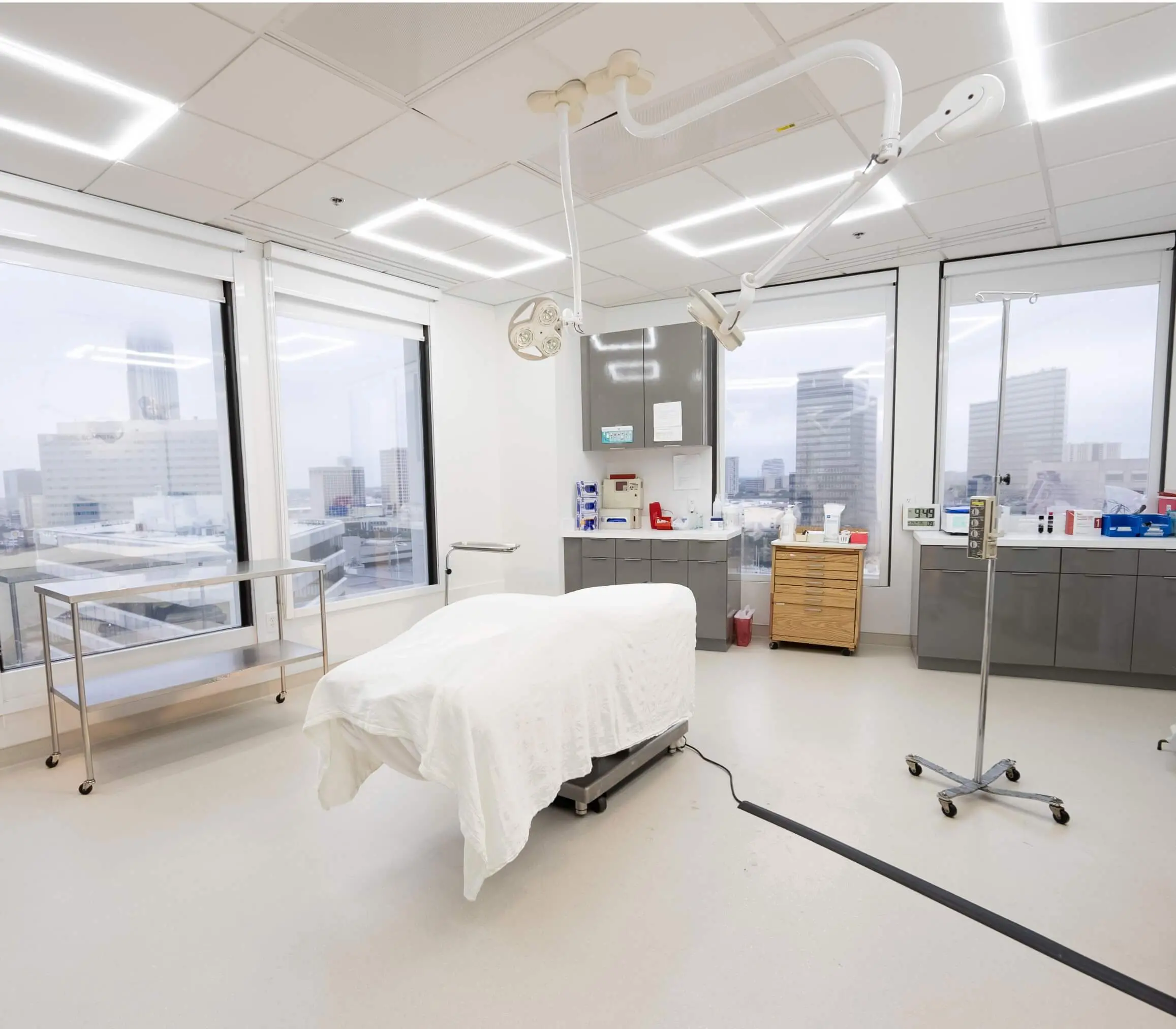
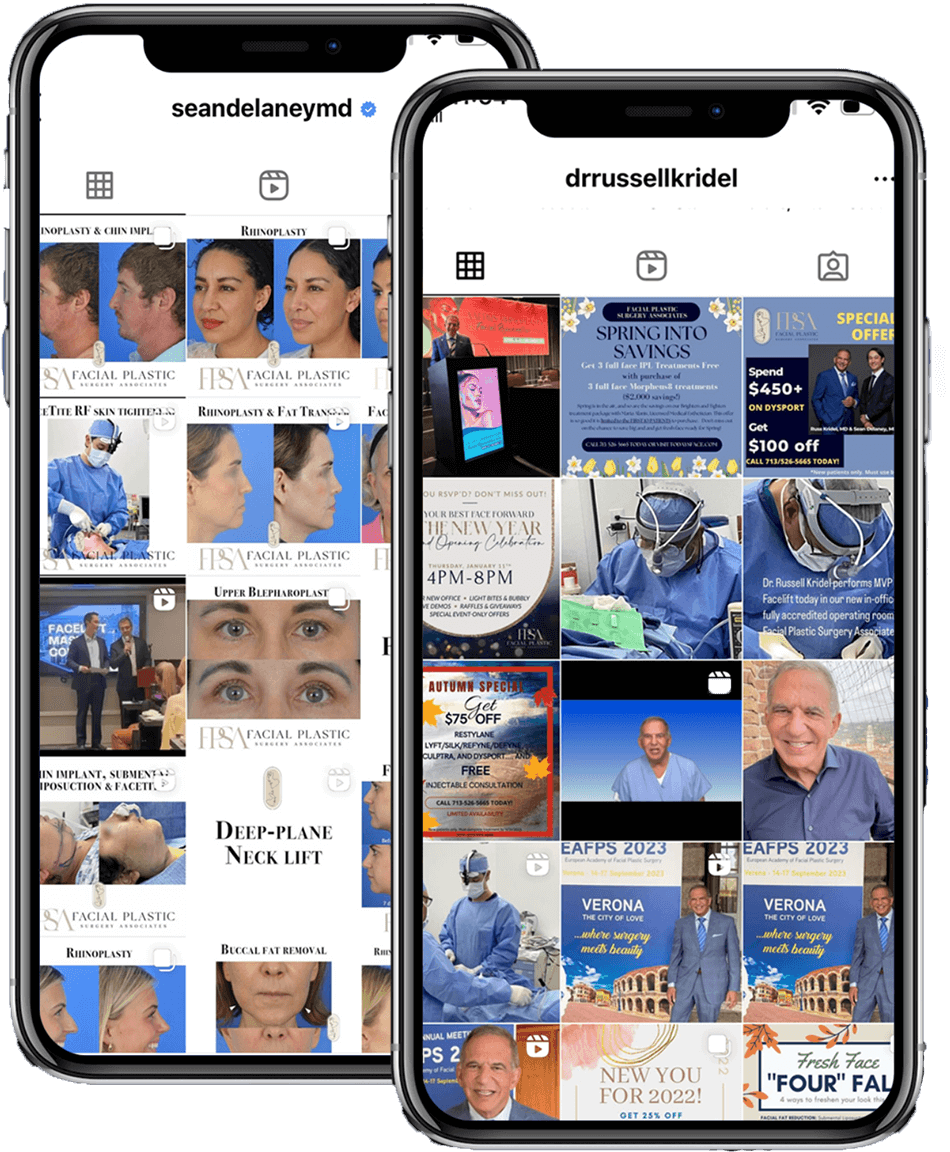
Let's Get Social
Connect with Us on Our Social Channels
Stay connected with us on social media and witness the impact Facial Plastic Surgery Associates has on the lives of our patients.
